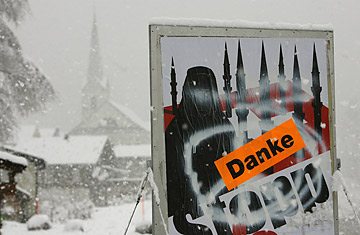
A poster of a conservative initiative promoting the ban of the building of minarets in Switzerland is sprayed with a peace sign and a sticker saying "Thank You"
The image of Switzerland abroad is of a place where peace, democracy and human rights are valued above all else. The Swiss were even instrumental in setting up the U.N. Human Rights Council, which is based in Geneva. But this reputation has taken a massive hit now that a majority of residents have voted to ban minarets on mosques, which a right-wing political party likened to missiles on campaign posters.
After months of heated debates fueled by charges of racism and religious discrimination, about 57% of the Swiss electorate voted to ban the construction of new minarets in a nationwide initiative Sunday. The result stunned the country's 400,000-strong Muslim community, especially since a poll conducted in late October indicated that a majority of Swiss voters were against the ban. "We are trying to digest this terrible shock, hurt and disappointment," Saida Keller-Messahli, president of the Zurich-based Forum for Progressive Islam, tells TIME. "We see this as a rejection of our culture and identity."
The party behind the initiative, the right-wing Swiss People's Party (SVP), had argued that Islamic symbols should be forbidden in Switzerland because they were a danger to Swiss society. The SVP claimed that minarets — the tall, thin towers on mosques that are used to call Muslims to prayer — in particular were dangerous because they were indicative of Islamic power and radicalism. If permitted, they could spark Islamic extremism in the country, the SVP said. "[The vote] clearly shows that our citizens refuse to accept the rampant Islamization of Switzerland," the party said Monday in a statement, adding that those who don't respect the country's laws should leave.
Opposition to the proposal was fierce. The government, most other political parties and religious and human rights groups had urged voters to reject the initiative, insisting it would violate the section of the constitution guaranteeing freedom of religion and incite hostility toward Switzerland's various religious and ethnic groups. Many of these groups now share the Muslim community's outrage. The Swiss Bishops Conference, backed by the Vatican, said the Catholic Church sees the decision as "an obstacle to a peaceful coexistence of different cultures and religions." The Protestant Church, meanwhile, called the vote "a violation of basic freedoms."
The vote is also a huge embarrassment for the Swiss government, which had launched a nationwide campaign promoting religious tolerance before the vote. "The outcome of the vote is a reflection of the fears and uncertainties that exist among the population, and concerns that Islamic fundamentalist ideas could lead to the establishment of parallel societies," Swiss Justice Minister Eveline Widmer-Schlumpf said Sunday. She added that "marginalization and exclusion on the basis of religious and cultural differences would be devastating for an open country such as Switzerland."
That acknowledgment won't lessen the criticism of leaders around the world. French Foreign Minister Bernard Kouchner said he was "shocked" by the vote. "It is an expression of intolerance," he told the French RTL radio station. "I hope the Swiss will reverse this decision quickly." The Council of Europe, a 47-member human rights group now chaired by Switzerland, called the outcome "a source of profound concern" and said it goes against "the values of tolerance, dialogue and respect for other people's beliefs."
Some have even voiced concern that the vote could spark the kinds of riots in the Muslim world that broke out after a Danish newspaper published cartoons lampooning the Prophet Mohammed in 2005. Reaction in the Muslim world was swift. Maskuri Abdillah, the head of Indonesia's largest Muslim group, Nahdlatul Ulama, said the vote reflected "a hatred of Swiss people against Muslim communities," while Grand Mufti Ali Gomaa, Egypt's highest religious official, called it an "insult" to Muslims and an "attack on freedom of beliefs." Keller-Messahli says she's concerned that radical Muslims could use the vote to convince other Muslims that Western societies discriminate against them. "They might use it as a ruse to stir trouble," she says.
Thus far, however, the initiative's opponents are taking a peaceful approach. On Sunday night, hundreds of people demonstrated on the streets of Zurich and Bern, carrying candles and carton minarets and waving signs reading, "This is not my Switzerland." That's a feeling many of the country's Muslims are undoubtedly sharing today.
